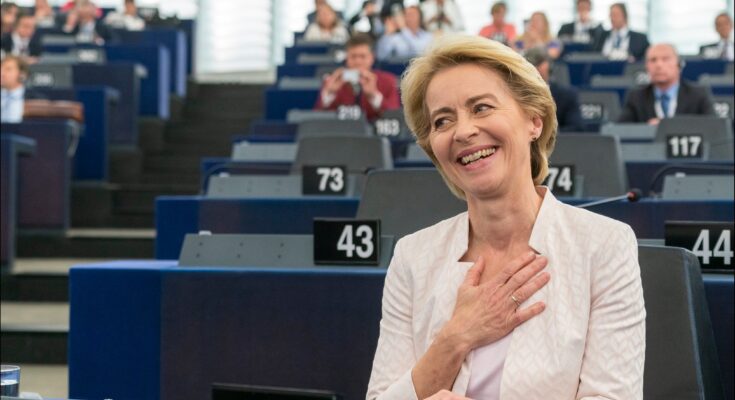Ursula von der Leyen has secured a second term as European Commission President, winning a clear victory in the European Parliament by 41 votes.
Von der Leyen’s victory was even more impressive than was the case in the first election in 2019. The Strasbourg chamber reportedly erupted with applause when it became evident that the first woman to lead the EU executive would again be elected.
The German Christian Democrat will now resume her role as head of the EU’s lawmaking and enforcement body until 2029. “I can’t begin to express how grateful I am for the trust of all MEPs that voted for me,” she tweeted minutes after the results.
The win strengthens von der Leyen’s reputation as one of the most important commission presidents in the history of the EU. The politician has been praised for her early support for Ukraine and a cutting-edge response to the pandemic.
However, she has also faced criticism for relying too heavily on a small group of advisers and evading scrutiny. On Wednesday, the European Court of Justice found that her commission had failed to give the public “sufficiently wide access” to the purchase deals for COVID-19 vaccines, as per The Guardian.
Von der Leyen addressed these concerns on Thursday, promising “more transparency, more accountability” and more frequent visits to the Parliament. Speaking on the floor of the Strasbourg chamber before the vote, she appealed to “all the democratic forces in this house” to support her, and announced a wide-ranging set of priorities for her second term, according to The Guardian.
“I will never accept that demagogues and extremists destroy our European way of life,” she said.
Von der Leyen’s reelection may be reaction to far-right surge
As head of the EU’s executive branch, the President of the European Commission sets the EU’s policy agenda, political direction and priorities, leads a cabinet of commissioners, and represents the EU at international meetings and summits.
The other two major jobs will be filled later this year by Antonio Costa, a former socialist prime minister of Portugal, who will lead the European Council, which represents the 27 EU governments, and Estonia’s Kaja Kallas, who has stepped down as prime minister to become the EU’s foreign policy chief, as reported by the BBC.
Before Thursday’s vote, von der Leyen succeeded in winning the support of her own center-right European People’s Party (EPP), the Socialist & Democrats, the liberal Renew, and the Greens. However, she did not universally gain the support of all of their members.
She acknowledged that the Greens had played a key role in securing a majority, saying she was “very grateful” for their support.
Far-right advances in recent elections, marred with a shaky international outlook, may explain why von der Leyen was reelected with an even greater majority than in 2019.



